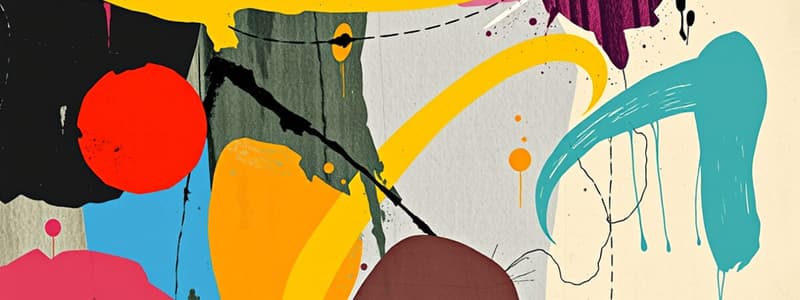Podcast
Questions and Answers
What is alliteration?
What is alliteration?
- An indirect reference to another work.
- The repetition of a pattern of consonants.
- The beginning of two or more words with the same letter or sound. (correct)
- A direct address to an absent listener.
What is an allusion?
What is an allusion?
An indirect or subtle reference to another character or work of literature.
Define anapest.
Define anapest.
A foot with two weak stresses followed by one strong stress.
What is an apostrophe in poetry?
What is an apostrophe in poetry?
What does assonance refer to?
What does assonance refer to?
What is blank verse?
What is blank verse?
Define connotation.
Define connotation.
What is consonance?
What is consonance?
Define couplet.
Define couplet.
What is a dactyl?
What is a dactyl?
What is denotation?
What is denotation?
Define diction.
Define diction.
What is a dramatic monologue?
What is a dramatic monologue?
Define enjambment.
Define enjambment.
What is a euphemism?
What is a euphemism?
Define exaggeration.
Define exaggeration.
What is figurative language?
What is figurative language?
Define foot in poetry.
Define foot in poetry.
What is free verse?
What is free verse?
What is hyperbole?
What is hyperbole?
Define iamb.
Define iamb.
What is imagery?
What is imagery?
Define irony.
Define irony.
What is dramatic irony?
What is dramatic irony?
Define situational irony.
Define situational irony.
What is verbal irony?
What is verbal irony?
Define lyric poem.
Define lyric poem.
What is a metaphor?
What is a metaphor?
Define meter in poetry.
Define meter in poetry.
What is metonymy?
What is metonymy?
Define octave.
Define octave.
What is onomatopoeia?
What is onomatopoeia?
Define oxymoron.
Define oxymoron.
What is persona in literature?
What is persona in literature?
Define quatrain.
Define quatrain.
What is repetition in poetry?
What is repetition in poetry?
Flashcards are hidden until you start studying
Study Notes
Poetry Vocabulary Words
- Alliteration: Repetition of the same initial consonant sounds in closely placed words.
- Allusion: A subtle reference to another literary work or character, enhancing meaning.
- Anapest: A metrical foot comprising two weak syllables followed by one strong syllable.
- Apostrophe: Directly addressing an absent person or abstract idea, often found in poetic forms.
- Assonance: Repetition of identical or similar vowel sounds within a passage, enriching musical quality.
- Blank Verse: Unrhymed poetry typically written in iambic pentameter; provides a natural rhythm.
- Connotation: The emotional or cultural associations a word carries, beyond its literal definition.
- Consonance: Pattern of consonant sounds repeated with varying intervening vowels, contributing to rhythm.
- Couplet: A pair of successive rhyming lines, often in iambic pentameter, establishing closure or emphasis.
- Dactyl: A metrical foot consisting of one stressed syllable followed by two unstressed syllables.
- Denotation: The explicit dictionary meaning of a word, devoid of any associated emotions.
- Diction: The specific choice and use of words in speech or writing, influencing tone and style.
- Dramatic Monologue: A speech revealing a character's emotions or thoughts, delivered to an audience or another character.
- Enjambment: Continuation of a sentence or phrase from one poetic line to the next without a pause.
- Euphemism: A milder term used in place of a harsher or more direct one, softening the impact of the statement.
- Exaggeration/Understatement: Techniques used to either amplify or downplay a statement for effect.
- Figurative Language: Use of expressions that convey meanings beyond the literal interpretation to evoke emotions.
- Foot: The basic unit of measurement in poetry; consists of a combination of stressed and unstressed syllables.
- Free Verse: Poetry without regular rhythm or rhyme, mimicking conversational speech while utilizing sound effects.
- Hyperbole: An intentional exaggeration for emphasis or effect.
- Iamb: A metrical foot containing one unstressed syllable followed by one stressed syllable.
- Imagery: Vivid descriptive language that creates sensory experiences through visual, auditory, or tactile references.
- Irony: A discrepancy between expectations and reality, enhancing themes and engagement.
- Dramatic Irony: A situation where the audience possesses greater knowledge than the characters, creating tension.
- Situational Irony: A contrast between anticipated outcomes and actual results, often highlighting unexpected turns.
- Verbal Irony: A figure of speech where the intended meaning differs from the literal meaning, often sarcastic.
- Lyric Poem: A short poem expressing personal emotions or thoughts, rather than narrating a story.
- Metaphor: A figure of speech that makes a direct comparison between two unlike things, asserting they are the same.
- Meter: The structured rhythm in poetry, measured in feet, yielding regular patterns of stressed and unstressed syllables.
- Metonymy: A figure of speech where a thing is referred to by the name of something associated with it.
- Octave: The first eight lines of a sonnet, setting up themes or arguments.
- Onomatopoeia: Words that mimic natural sounds, enhancing the auditory experience.
- Oxymoron: A figure of speech that juxtaposes contradictory terms, revealing paradoxes.
- Persona: The character or narrator in a poem created by the author, distinct from the author's true self.
- Quatrain: A stanza or verse of four lines, commonly found in sonnets, typically containing alternating rhyme.
- Repetition: The recurrence of words, phrases, or sounds to emphasize a theme or idea.
Studying That Suits You
Use AI to generate personalized quizzes and flashcards to suit your learning preferences.




